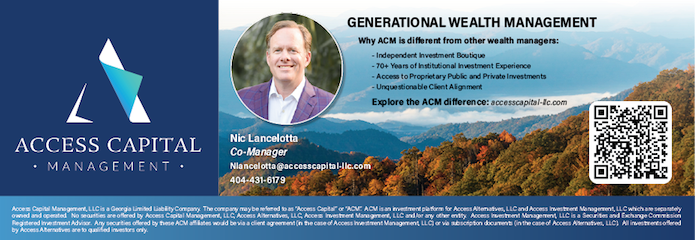Right Tool for the Job
07 Oct 2020
Financial advisors are ready to help you complete more than just the task at hand.
By KAT FORD

Wealth management is a holistic technique to managing assets; it is not a one-size-fits-all approach, as different lifestyles require different needs. Furthermore, those needs may vary while moving from one stage of life to another. This means looking at both investable assets (those easily converted to cash value, like stocks) and non-investable, or tangible assets (those not easily converted, like real estate). Likewise, considering the right set of tools to help you achieve your life goals, like college, estate, life insurance and portfolio planning.
Many of us have our plates full in the process of making money and less time available to effectively study how to organize and execute. There are several financial offices located on the plateau with professionals waiting to help clients find the 'holes' in the 'whole' and manage their assets in a way that lets their money work for them. Often, we find ourselves looking at the immediate plan of action – like setting aside money for college tuition. It's the financial advisor who will be thinking ahead and flipping through the playbook, simultaneously looking to move the ball down the field towards retirement.
The playbook might be one of the most critical roles of the investment professional. Experience, historical examples and models allow for confident and calm decision making. When the market reacts to the upcoming presidential election, the financial expert will know from years of industry study to expect, not fear election cycle volatility. Wealth management counseling will also consider your assets' concentration and help you strategize accordingly. If your family business is in real estate or construction, your advisor might encourage you to make portfolio investments that don't include these or similar industries, like timber. That way, if housing takes a hit, you're not taking it from all angles.
Wisdom from counsel is imperative when contemplating important decisions. For instance, when to sell major assets. Seeking the correct way or time to sell can have significant tax ramifications, and an expert can steer you in the right direction. A professional can similarly offer a second opinion on financial language in legal documents- pointing out areas of concern. When it comes to estate planning, an advisor can help facilitate the legacy you leave behind, including charitable donations. This writer can say firsthand that after my father's sudden and unexpected death at age 65, the trust my family had in our financial consultant offered much comfort. That relationship allowed us to make crucial and timely decisions that we would not have the clarity of mind to make on our own for many months.
There is a toolbox full of instruments to be considered for various situations when it comes to wealth management. Seeking professional advice will ensure you are using the right equipment for the job. While we might not all know what SEC stands for, most of us understand how hard it is to patch a hole with a screwdriver. Find a trusted financial advisor, and you will be shoring up the foundation of your financial future in no time.
Qualified Charitable Distributions
Provided by Benjamin F. Edwards & Co. and Justin Souma, CFP®, AAMS®

If you’ve made contributions to a traditional IRA, you may be aware that you are obliged to start taking what are known as required minimum distributions (RMDs) when you reach either age 70 ½ (if you were born on or before June 30, 1949) or age 72 (if you were born on or after July 1, 1949). RMDs are designed to help the federal government collect taxes on the money that was not taxed when it was first deposited in the IRA – and remained untaxed as it grew. The amount you withdraw is considered income for the tax year in which it’s withdrawn. A special rule applies in 2020 that suspends all RMDs for the year.
What you may not have heard of are Qualified Charitable Distributions (QCDs) – tax free distributions that are made directly from an IRA to a charitable institution for people who are older than age 70 ½. QCDs allow you to direct up to $100,000 each year to a qualified charity. This distribution directly to the charity is not included in your taxable income on your federal tax return. Congress first authorized QCDs in 2006 on a temporary basis, but it became a permanent part of the tax code in 2015.
The case for a Qualified Charitable Distribution
You might consider making a Qualified Charitable Distribution if you:
- don’t need all the income from your IRA
- make charitable gifts, but don't itemize deductions (usually, charitable donations only benefit taxpayers who itemize)
- want to avoid being taxed on your IRA distributions
Be mindful of these limitations
Some other considerations to think about as you consider this strategy include the fact that:
- you must be at least age 70½ when the gift is transferred
- not all charities are eligible and the gifts must be outright, not part of an annuity or charitable remainder trust
- transfers must go directly to the charity from the IRA
- if you have assets in a 401(k) or 403(b), or other employer-sponsored plan that typically requires minimum distributions, for example a SEP IRA or SIMPLE IRA, QCDs do not apply to those distributions, however plan assets that are rolled into an traditional IRA would become eligible
- Roth IRAs can also make QCDs, but because Roth contributions may already be income tax free to you during retirement (if you older than 59 ½ and have held the Roth IRA for 5 years), there is no additional tax benefit you receive from making the direct gift to the charity from a Roth IRA.
What Should You do With an Inheritance?
Provided by: Mary Beth Brody, your local Edward Jones Financial Advisor
If you were to inherit a large sum of money, what would you do with it?
The question may not be hypothetical, especially if you are in the millennial, Gen X or Gen Z demographic groups. That’s because the baby boomers – often referred to as the richest generation in history – are poised to transfer some $30 trillion in assets over the next few decades, according to the consulting firm Accenture.
Of course, this is a “macro” figure, and everyone’s situation is different. Furthermore, since baby boomers are living longer, more active lives, the total amount passed on may end up being considerably less than the estimate. Nonetheless, you may well receive a medium-to-large inheritance someday, and when that day arrives, you’ll need to decide how best to use your newfound wealth.
Your first move may be to do nothing at all. Generally speaking, you have enough time to decide how to handle the various elements of an inheritance, although if you are inheriting an investment vehicle such as an IRA or a 401(k) plan, you will eventually have to make some decisions about liquidation or withdrawals. (And since these accounts may carry tax obligations, it’s a good idea to consult with your tax advisor fairly soon after you receive your inheritance.) But if a big part of your inheritance simply consists of cash parked in a bank account, there’s nothing wrong with moving the money into a cash management account at a financial services company until you decide what to do with it
However, after some time has passed, you may want to put your inheritance to good use. If you’re already working with a financial advisor, you might want to get some guidance on how to use your new assets to strengthen your existing investment strategy. Do you have any gaps in certain areas? Can you use the money to help diversify your holdings? Diversification can’t guarantee profits or protect against all losses, but it can help reduce the impact of volatility on your portfolio.
And, of course, if your inheritance is large enough, it may permit you to “max out” on your IRA for years to come, and possibly free you to have even more of your salary deferred into your 401(k) or similar employer-sponsored retirement account. Plus, you could use the money for other long-term goals, such as funding a tax-advantaged 529 college savings plan for your children.
You also might use part of your inheritance to donate to the charitable organizations you support. Due to recent changes in tax laws that caused many people to stop itemizing their deductions, charitable groups are in more need of support than ever.
And last, but certainly not least, take this opportunity to review your goals. Is your inheritance large enough for you to adjust your planned retirement age? And if that age may indeed change, what about your other plans for retirement? Will you now be free to travel more or pursue other hobbies? Will you even need to modify the way you invest for your new reality, possibly by taking a less aggressive approach? Again, a financial professional can help you answer these questions
Someone thought enough of you to leave you a valuable inheritance – so use it wisely.
This article was written by Edward Jones for use by your local Edward Jones Financial Advisor.
Edward Jones, Member SIPC













